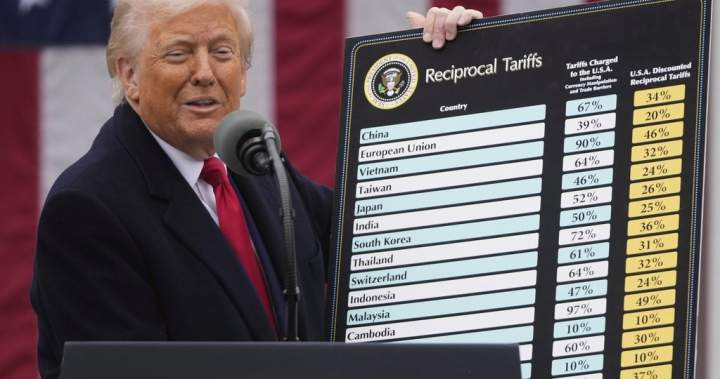This week marks eight months since President Donald Trump’s second administration began in the U.S., forcing Canada and other countries around the world to navigate tariffs.
Martha Harrison, trade lawyer with the firm McCarthy Tétrault, told Global News that their client base has been “dramatically impacted” by the volatility that now exists in the international trade sphere.
“Traditionally, when we are supporting clients entering into Canada or exporting out of Canada, we’re looking at usually two or three key relationships to support them in that process,” she explained.
“And when you have two or three key relationships, developing, as you say, a Plan A and a Plan B is part of our sort of everyday strategic commercial advice. But in the current context, when we have the United States administration that is enacting and administering tariffs all over the world at different tariff rates and on different commodities depending on the particular climate, both politically, economically, it becomes exceedingly difficult to actually produce that Plan C, D or E when we’re going down that supply chain.”
Harrison said every tariff is like a domino that has effects through the supply chain. “So from a commercial perspective, this has been an extremely challenging time for our clients,” she said.
She added that they have advised their clients to dive deeper into their commercial relationships and potentially reframe contractual agreements, understand what the tariff exposure is and start exploring other markets to diversify supply chain management.

Get daily National news
Get the day’s top news, political, economic, and current affairs headlines, delivered to your inbox once a day.
On Friday, the Canadian government launched public consultations on the Canada-United States-Mexico Agreement (CUSMA) that facilitates free trade across North America. It is set for a joint review in 2026.
For now, most goods from Canada and Mexico entering the U.S. are avoiding tariffs because of CUSMA. However, that could change if Trump seeks major changes to the agreement or withdraws from it altogether.
“We are telling clients to stay the course,” Harrison said.
“There’s no doubt that this will be the most important negotiation that the Carney administration will have in the near future. What’s interesting is that Prime Minister (Mark) Carney and Mexican President (Claudia) Sheinbaum have entered into a specific project-based agreement now, looking at all manner of sectors, looking at ports, rails, infrastructure, energy, security.”
She said they are informing their clients that there is a plan to place to ensure that while volatility exists between Canada and the U.S., Canada and Mexico can negotiate as a block against the United States.
“So our clients are looking forward to achieving some stability, but we’re again encouraging them to consider alternative markets with a special focus on (those) where Canada has a free trade agreement, such as the European Union,” Harrison added.
“We’ve seen a real uptake and interest in that area, and bilateral trade between the EU and Canada is going to meaningfully increase over the next 24 months, and our clients want to have a lot to do with that.”

Harrison said that time will tell what happens between the U.S., Canada and Mexico, but she said it is likely that Canada and Mexico have to come to the table with different proposals that can be used as negotiating and leverage tools.
“One example might be deeper security relationships,” she added.
“We know that border security is an area where President Trump would love to see additional wins. So playing into that desire for additional wins will be important for Canada. And once we know what sectors and what relationships are going to be discussed and negotiated between the three countries, I think we’ll better be able to predict how this will play out for Canadian industry generally.”
© 2025 Global News, a division of Corus Entertainment Inc.
Navigating 8 months of Donald Trump’s tariffs has been ‘extremely challenging’, lawyer says





